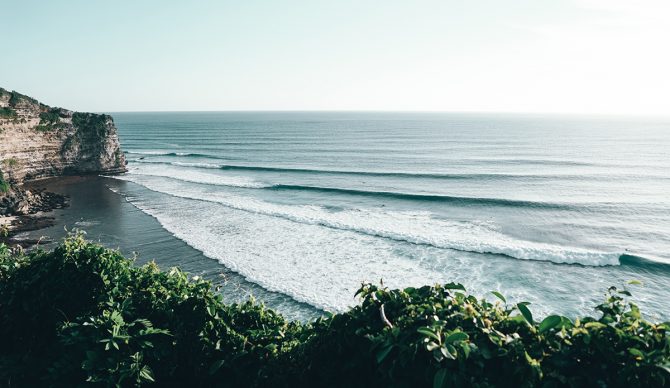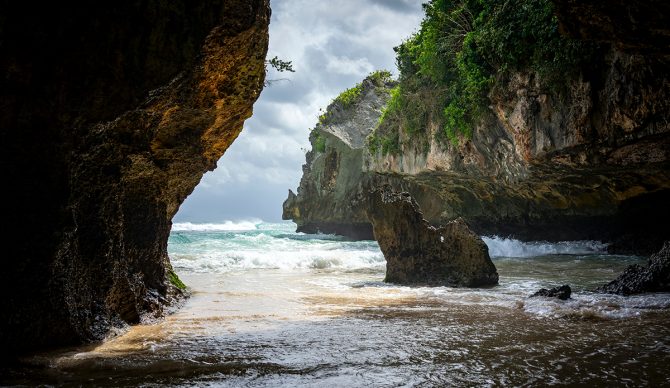
The crown jewel of Bali, Uluwatu. Photo: Steven Wilcox//Unsplash
The recent viral video that we’ve all seen of a man punching a woman in a Balinese lineup triggered memories of my time surfing on the island. Of course, it was just one extreme example of aggressive surfers acting like idiots. But based on my experience during a two-month stay in Bali, I do think it provides a glimpse of the tension caused by the island’s overcrowded lineups.
Navigating a comically crowded Balinese lineup can be interesting. Somewhere between trying to find breathing room among 75 people, a few pro surfers sprinkled into the mix, and local ‘guides’ pushing their foreign clients into waves they couldn’t paddle into themselves, getting a session in Bali that you’re satisfied with can feel a bit bizarre.
Surfing has changed Bali as much as (if not more) than any other place on Earth in the last 50 years. The crowds, resorts, surf shops, traffic, and cafes are a far cry from the dirt-road Uluwatu adventure that Gerry Lopez experienced in 1974.
In the post hysteria of the punch heard ‘round the world, I thought it was a relevant time to check in with surfers who call Bali home and hear their thoughts about the state of affairs on their island – the localism, the crowds, the development, and the solutions.
View this post on Instagram
What Is the State of Localism in Bali
Flora Christin gave up the city life of Jakarta to travel the world. In 2016, she landed in Bali and fell in love with surfing, rising the ranks to become Indonesia’s first competitive female longboarder. But as an outsider who moved to the island, she admits that she has experienced localism firsthand.
“There is definitely localism (on Bali), especially down the Bukit (Peninsula) and the east coast,” said the 32-year-old. “When I was a beginner I couldn’t afford to hire a surf instructor every day and I did get into some incidents with the local instructors. One guy got so angry because I dropped in on his student in the whitewash that he landed a punch on me.”
Christin recounts similarly bad vibes from local surfers at spots like Sanur and Medewi. However, after many years living in Bali and improving her surfing, things have changed, at least for her.
“It is completely different how people treat me now because I made my way up to gain respect from the locals wherever I go,” said Christin. “If anyone (shows localism towards) me, I’ll ask them to talk about it. We can always communicate. Surfing is supposed to be fun.”
To be fair, localism exists to some degree wherever there’s surfing. However, it’s the unparalleled crowds and influx of inexperienced or uneducated surf tourists that add fuel to the fire.
Mega Semadhi, the 2016 Padang Padang Cup Champion and Bingin Beach local, explained how he sees this phenomenon unfold.
“A lot of the time people get off the plane, they see the waves, and they are frothing,” explained Semadhi. “They don’t realize that it’s crowded and, yes, they are excited to surf because they are only here for five days and – boom – they are in trouble. It takes a lot to piss Balinese people off. We are known for how happy we are.”
While the Balinese people are indeed known for their kindness and hospitality, Semadhi has a cultural explanation for why they also are adamant about protecting their waves.
“Every Balinese person belongs to a banjar (a Balinese word for their locally governed and policed villages),” said Semadhi. “We are born and die in that banjar. When we are part of the banjar it is our duty to serve and protect our community. I think this also is why Bali is so localized. It is our way of life, not just in the water, but out of the water too.”

Oh, to preserver places like this. Photo: Niklas Weiss//Unsplash
Is localism necessary in Bali?
Despite her negative experiences with localism, Christin acknowledges that it serves a purpose to an extent.
“I actually agree with localism in a way,” said Christin. “For example, there are too many foreign surf guides on the island who work illegally. So we kind of need the locals to put them in their place. You cannot just come to my country, work illegally, take jobs from the locals, and not even follow the rules.”
Semadhi agrees that there is a correct amount of localism needed in Bali.
“I grew up surfing in Bingin which is famous for its small take-off spot,” said Semadhi. “It’s one of the most localized surf spots in Bali. I see localism as a regulator in the water, which is needed in certain locations. There have been issues with heavily localized spots in Bali, but if you respect the locals and be observant of the rules, you will be fine.”
According to Semadhi, people like the Brazilian man who instigated the infamous punching incident are too often incorrectly assuming the role of locals.
“Currently a lot of people think because they live in a place for one, three, or even seven years they are local there,” explained Semadhi. “But, for example, my wife is Taiwanese. Even if I moved and lived in Taiwan for a number of years, I will never be a local there. I will never understand their culture and customs fully because I’m not from there. This applies to Bali too.”
Ferina Wulandari, a 34-year-old surfer-entrepreneur who owns a small surf shop in Uluwatu, points to the aggressive Brazilian incident as an example of what can happen without localism.
“If there was a local in the lineup (the day of that fight) none of that would have happened,” said Wulandari.
Taking the ‘good’ parts of localism and criticizing the ‘bad’ is a fine line to walk – perhaps an unrealistic ideal. But Semadhi acknolwedges there is a line that exists.
“Crossing the line is basically bullying people in the lineup when they haven’t done anything wrong,” said Semadhi. “Surfing is for everyone. It should be a fun and happy time. But it’s important to know the etiquette.”

The view flying into Bali. The open space is going away. Photo: Yulia Agnis//Unsplash
Bali’s Love-Hate Relationship With Tourism
It’s no secret that tourism has exploded in Bali. It has benefits and drawbacks.
“The past eight years in Canggu have been a ‘wow’ moment for me,” said Christin regarding the city’s ever-increasing development. “I am always thinking, ‘When will this ever stop?’”
Whether you believe this unprecedented development is good or bad, the Balinese have grown to depend on it. According to a report in the Journal of Tourism and Hospitality Management published in 2017, nearly 52 percent of the Balinese labor force earns its income directly or indirectly from the tourism industry, which accounts for 68 percent of the island’s economy. The small island of Bali makes up just 0.29 percent of the Indonesian landmass, yet accounts for 41 percent of all foreign tourism to the country.
Local business owners, like Wulandari, rely on the visitors.
“My shop really depends on tourism,” said Wulandari. “I’d say 95 percent of the business is from tourists, 50 percent of whom are foreigners. Without tourism we are nothing.”
Tourism is a double-edged sword. It simultaneously feeds the locals, but at the expense of the quality of life on the island – e.g. less green spaces, more traffic jams, and a depleted water supply. Wulandari understands this conundrum.
“I think it depends on the area of the island, but the development is going too fast and the local people can’t control it,” said Wulandari. “The crowds really affect us: We cannot find green places and we lose our peace. We often lose the lovely views of our rice paddies for developments, for example.”
Wulandari brings up another good point: Much of the money being pumped into the development and tourism sectors is not from the locals, but from foreigners, a process made easier by a newly introduced “second home visa” for foreign nationals.
“Some of the foreigners investing in Bali is good because the locals need the jobs,” Wulandari added. “But on the other hand, I see how we lose our identity. Sometimes it doesn’t even feel like I am in Indonesia. I feel like I’m in a foreign country.”

Bali: a place worth saving.
What’s the Solution?
None of the locals I spoke to are calling for an end to tourism or foreign investment. To the contrary, they are thankful for the opportunities that tourism provides. They just strive for some simple ideals: forward thinking, regulation within reason, and visitors who bring a good attitude.
“I don’t agree how things have overdeveloped in such a short time,” said Christin. “I am happy to see that the locals are making a living again after the pandemic, but the government needs to slow the development down and set more of a standard and procedure. For example, they could designate more ‘green zones’ (areas that cannot be developed).”
“Also, in general there is a lack of education,” Christin added. “Too often people see an opportunity come to their doorstep and they take it because they don’t understand what is good for the next generation and the future of the island.”
The Balinese government indeed has been eyeing stricter regulation as a solution to some of the overcrowding problems. For starters, they have proposed a ban on scooter rentals to foreigners, a law that Wulandari notes is impractical due to the lack of public transportation and the locals who depend on the rental income.
Despite the craziness and crowding in Bali, the island has earned its reputation as a top-tier travel destination for a reason. The waves, beaches, hospitality, and nature – all at an extremely affordable price – are world class.
There is no quick solution to cure Bali’s problems, but Semadhi highlights simple steps that visitors can start with.
“It’s important to know your (surfing) ability and be honest if it’s suitable for you to paddle out,” said Semadhi. “Ask the lifeguards or get a local coach to show you the ropes. You’ll have fun instead of causing issues in the lineup. The key is to have fun.”
“Bring good vibes with you and don’t have expectations,” added Semadhi. “Do this and you’ll enjoy every moment. And use these three magic words: thanks, please, and sorry.”

